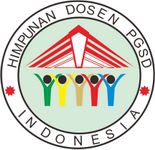The Impact of Open-Ended Based Learnıng Modıfıed by Realıstıc Mathematıc Educatıon on Computatıonal Thınkıng Skılls
Abstract
This research was based on the problem of students' computational thinking skills that are still low, especially in elementary school mathematics subjects in term of students' mathematics anxiety. One solution is to use a learning method to improve computational thinking skills: Problem Based Learning (PBL) modified with the Open-Ended Problem (OEP) and Realistic Mathematic Education (RME) approaches to produce the Open-Ended Based Learning Modified by Realistic Mathematic Education (OEBL-RME) method. The purpose of this study is to determine the impact of the OEBL-RME method on computational thinking skills in terms of mathematics anxiety in elementary school students. This research used quasi-experimental method of post-test only control group design using a design treatment by level 2x2. Data were collected using computational thinking skills tests and math anxiety questionnaires and analyzed with the 2-way ANAVA test using SPSS 27. The sample used was 108 grade V elementary school students consisting of 54 students in the experimental class and 54 students in the control class. The results showed that there is an impact of OEBL-RME method on students' computational thinking skills in learning mathematics. In addition, it is proven that there is an interaction between learning methods and mathematical anxiety towards computational thinking skills.
Keywords:
Computational Thinking Ability, Mathematical anxiety, Open-Ended Based Learning, Realistic Mathematic Education.Downloads
References
Abidin, Z. (2020). Universitas Bhayangkara Jakarta 3) Mathematical Reasoning Abilities In Elementary Schools. Dkk JMIE : Journal of Madrasah Ibtidaiyah Education, 4(1), 2020. http://e-journal.adpgmiindonesia.com/index.php/jmie
Almulla, M. A. (2020). The Effectiveness of the Project-Based Learning (PBL) Approach as a Way to Engage Students in Learning. SAGE Open, 10(3). https://doi.org/10.1177/2158244020938702
Fajri, M., & Yurniwati. (2021). COMPUTATIONAL THINKING , MATHEMATICAL THINKING BERORIENTASI COMPUTATIONAL THINKING , MATHEMATICAL THINKING BERORIENTASI GAYA KOGNITIF PADA PEMBELAJARAN MATEMATIKA DI SEKOLAH DASAR. March 2019.
Gunderson, E. A., Park, D., Maloney, E. A., Beilock, S. L., & Levine, S. C. (2018). Reciprocal relations among motivational frameworks, math anxiety, and math achievement in early elementary school. Journal of Cognition and Development, 19(1), 21–46. https://doi.org/10.1080/15248372.2017.1421538
Hanum, L., & Amini, R. (2023). Pengembangan E-LKPD Berbasis Problem Based Learning Menggunakan Aplikasi Book Creator di Kelas III Sekolah Dasar. Jurnal Elementaria Edukasia, 6(4), 2183–2194. https://doi.org/10.31949/jee.v6i4.7963
Jameson, M. M. (2014). Contextual factors related to math anxiety in second-grade children. Journal of Experimental Education, 82(4), 518–536. https://doi.org/10.1080/00220973.2013.813367
Jiang, B., & Li, Z. (2021). Effect of Scratch on computational thinking skills of Chinese primary school students. Journal of Computers in Education, 8(4), 505–525. https://doi.org/10.1007/s40692-021-00190-z
Jun, S. J., Han, S. K., & Kim, S. H. (2017). Effect of design-based learning on improving computational thinking. Behaviour and Information Technology, 36(1), 43–53. https://doi.org/10.1080/0144929X.2016.1188415
Khatimah, H., & Fatimah, N. (2023). Pengembangan LKPD Etnomatematıka Berbasıs Rme Untuk Menıngkatkan Lıterası Matematıka Sıswa. Jurnal Elementaria Edukasia, 6(4), 1680–1686. https://doi.org/10.31949/jee.v6i4.7115
Kong, S.-C., Abelson, H., & Kwok, W.-Y. (2022). Introduction to Computational Thinking Education in K–12. In Computational Thinking Education in K–12. https://doi.org/10.7551/mitpress/13375.003.0002
Kwon, K., Ottenbreit-Leftwich, A. T., Brush, T. A., Jeon, M., & Yan, G. (2021). Integration of problem-based learning in elementary computer science education: effects on computational thinking and attitudes. Educational Technology Research and Development, 69(5), 2761–2787. https://doi.org/10.1007/s11423-021-10034-3
Lyons, I. M., & Beilock, S. L. (2020). Mathematics anxiety: Separating the math from the anxiety. Cerebral Cortex, 22(9), 2102–2110. https://doi.org/10.1093/cercor/bhr289
Monalisa, M. (2023). Analisis Berpikir Komputasional Siswa SMP pada Kurikulum Merdeka Mata Pelajaran Informatika. DIAJAR: Jurnal Pendidikan Dan Pembelajaran, 2(3), 298–304. https://doi.org/10.54259/diajar.v2i3.1596
Mrizkidirmansyah, & Febriandi, R. (2023). Meningkatkan Kemampuan Problem Solving Matematika Siswa Sd Melalui Implementasi Model Problem Based Learning. Jurnal Elementaria Edukasia, 6(4), 2135–2144. https://doi.org/10.31949/jee.v6i4.7591
Munawarah, Thalhah, S. Z., Angriani, A. D., Nur, F., & Kusumayanti, A. (2021). Development of Instrument Test Computational Thinking Skills IJHS/JHS Based RME Approach. Mathematics Teaching-Research Journal, 13(4), 202–220.
Murni. (2013). Open-Ended Approach in Learning to Improve Students Thinking Skills in Banda Aceh. International Journal of Independent Research and Studies, 2(2), 95–101.
Mutlu, Y. (2019). Math anxiety in students with and without math learning difficulties. International Electronic Journal of Elementary Education, 11(5), 471–475. https://doi.org/10.26822/iejee.2019553343
Nasution, W. N. (2020). Expository Learning Strategy: Definition, Goal, Profit and Procedure. IOSR Journal Of Humanities And Social Science (IOSR-JHSS, 25(5), 7–10. https://doi.org/10.9790/0837-2505080710
Nohda, N. (2000). Teaching by open-approach method in Japanese mathematics classroom. Proceedings of the 24th Conference of the International Group for the Psychology of Mathematics Education, 1, 39–53.
Özkaya, A., & Yetim Karaca, S. (2017). The effects of Realistic Mathematics Education on students’ achievements and attitudes in fifth grades mathematics courses. International Online Journal of Education and Teaching (IOJET), 2017(2), 185–197. http://iojet.org/index.php/IOJET/article/view/187/162
Palts, T., & Pedaste, M. (2020). A model for developing computational thinking skills. Informatics in Education, 19(1), 113–128. https://doi.org/10.15388/INFEDU.2020.06
Ramirez, G., Shaw, S. T., & Maloney, E. A. (2018). Math Anxiety: Past Research, Promising Interventions, and a New Interpretation Framework. Educational Psychologist, 53(3), 145–164. https://doi.org/10.1080/00461520.2018.1447384
Shute, V. J., Sun, C., & Asbell-Clarke, J. (2017). Demystifying computational thinking. Educational Research Review, 22, 142–158. https://doi.org/10.1016/j.edurev.2017.09.003
Soraya, F., Yurniwati, Y., Cahyana, U., & Syarif Sumantri, M. (2018). The Application of Realistic Mathematics Education (RME) Approach to Increase the Creative Thinking Ability of Fraction Subject Matter for Fourth-Graders of SDN Rawajati 06 Pagi. American Journal of Educational Research, 6(7), 1016–1020. https://doi.org/10.12691/education-6-7-19
Tekdal, M. (2021). Trends and development in research on computational thinking. In Education and Information Technologies (Vol. 26, Issue 5). Springer US. https://doi.org/10.1007/s10639-021-10617-w
Turgut, S., & Turgut, İ. G. (2020). Me while i am learning mathematics: Reflections to elementary school students’ drawings. International Electronic Journal of Elementary Education, 13(1), 139–154. https://doi.org/10.26822/iejee.2020.179
Vinson, B. M. C. (2021). A comparison of preservice teachers’ mathematics anxiety before and after a methods class emphasizing manipulatives. Early Childhood Education Journal, 29(2), 89–94. https://doi.org/10.1023/A:1012568711257
Zhang, J., Zhao, N., & Kong, Q. P. (2019). The relationship between math anxiety and math performance: a meta-analytic investigation. Frontiers in Psychology, 10(AUG), 1–17. https://doi.org/10.3389/fpsyg.2019.01613











